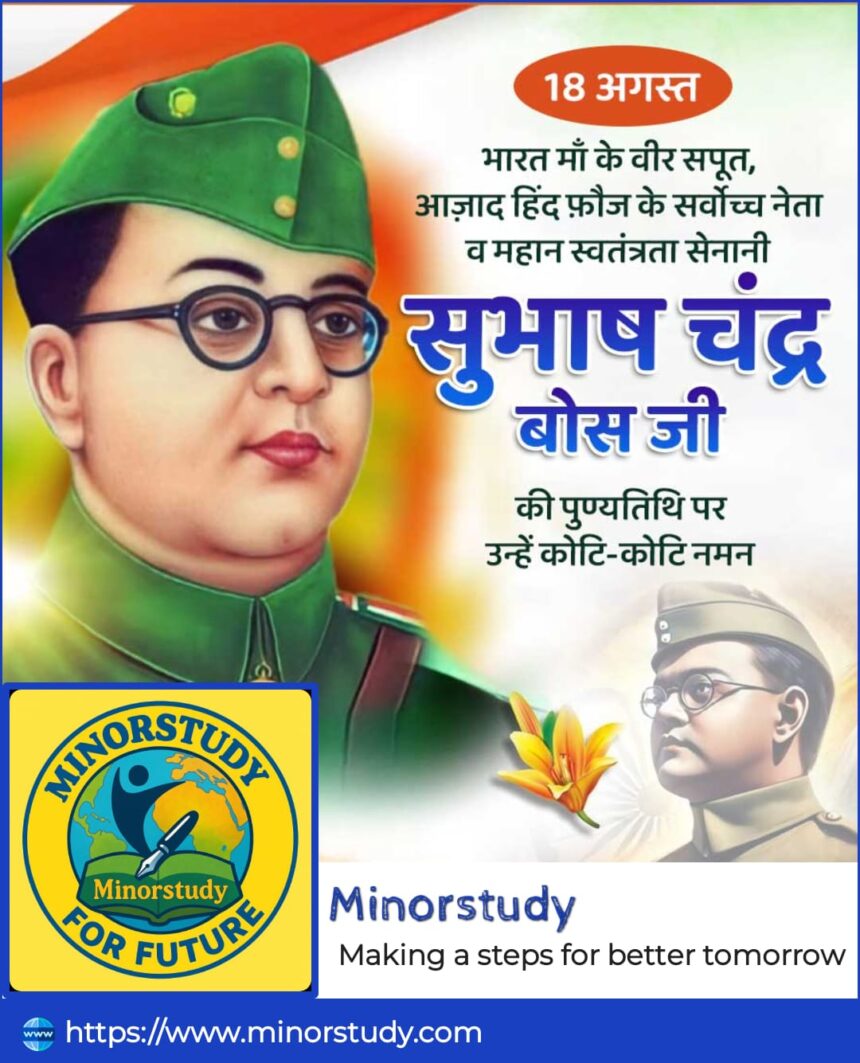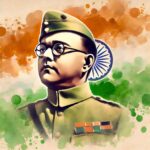🌟 9 Glorious Reasons Why Netaji Subhash Chandra Bose Still Inspires India on His Death Anniversary
🙏 Tributes to the brave son of Mother India, Netaji Subhash Chandra Bose 🙏
- Introduction
- History of Netaji Subhash Chandra Bose
- 10 Important Facts About Netaji Subhash Chandra Bose
- Timeline of Subhash Chandra Bose
- Significance of Subhash Chandra Bose’s Death Anniversary
- Observance of Netaji’s Death Anniversary
- Wishing on Netaji’s Death Anniversary
- Importance in Our Life and Society
- FAQs on Subhash Chandra Bose
- Conclusion – Netaji’s Eternal Daily Life Impact
On his death anniversary, we bow our heads in reverence to the supreme leader of the Azad Hind Fauj, a true patriot, and one of the greatest freedom fighters of Bharat Mata.
Netaji’s unmatched courage, unshakable determination, and sacrifice for the nation continue to inspire every Indian. His call of “Give me blood, and I shall give you freedom!” still ignites the flame of patriotism in our hearts.
Let us honor his legacy by walking on the path of unity, discipline, and selfless service to the motherland.
Jai Hind! 🇮🇳
Introduction
“Jai Hind!” – these two words, once electrified by the voice of Netaji Subhash Chandra Bose, continue to stir the soul of every Indian even decades after his mysterious death.
On 18th August 1945, India allegedly lost one of its bravest sons in a plane crash in Taiwan. To this day, the death anniversary of Subhash Chandra Bose remains a solemn moment of remembrance, respect, and reflection. Though debates and unanswered questions linger about whether he truly perished in that crash, one truth is undeniable: Netaji’s spirit never died.
He was the supreme leader of the Azad Hind Fauj (Indian National Army), a man who dared to challenge the British Empire with both words and weapons, and whose courage went beyond fear itself. On his death anniversary, India does not merely mourn him—it celebrates his fiery nationalism, his unwavering vision, and his unforgettable contribution to the freedom struggle.
This article explores all about Netaji Subhash Chandra Bose—his history, important facts, timeline, significance, observance, FAQs, tributes, and the lessons his life continues to offer to our society and daily life.
History of Netaji Subhash Chandra Bose
Birth & Early Years: Born on 23rd January 1897 in Cuttack, Odisha, Subhash Chandra Bose was the son of Janakinath Bose, a successful lawyer, and Prabhavati Devi, a devout mother who instilled spiritual values in him.
Education: A brilliant student, Bose studied in Kolkata and later in Cambridge University, England. He cleared the prestigious Indian Civil Services (ICS) exam but resigned in 1921, declaring that he could not serve a colonial government.
Political Career: Bose joined the Indian National Congress, quickly rising through its ranks. He became the President of the Congress in 1938 at the Haripura Session, but ideological differences with Mahatma Gandhi and others led him to resign and form the Forward Bloc.
World War II & INA: During the Second World War, Bose sought international support from Germany and Japan. In 1943, he became the Supreme Commander of the Indian National Army (INA), which fought against the British alongside Japanese forces. His stirring slogan, “Give me blood, and I shall give you freedom!”, galvanized thousands to join him.
Final Days: On 18th August 1945, Netaji reportedly died in a plane crash in Taiwan. However, mystery surrounds his death, and many Indians continue to believe he survived.
10 Important Facts About Netaji Subhash Chandra Bose
Netaji was deeply inspired by Swami Vivekananda and Sri Ramakrishna Paramahansa.
He was elected Congress President twice but resigned due to ideological clashes.
His Azad Hind Government (1943) was recognized by 11 countries.
He coined and popularized the slogan “Jai Hind”.
The INA’s Rani Jhansi Regiment was the first all-women combat regiment in modern history.
Bose was imprisoned 11 times by the British between 1921–1941.
His daring escape from house arrest in Kolkata in 1941 remains legendary.
The Azad Hind Radio in Germany broadcasted his speeches to inspire Indians.
Netaji advocated industrialization and strong defense policies for a free India.
His death remains one of the greatest unsolved mysteries in modern Indian history.
Timeline of Subhash Chandra Bose
1897 – Born in Cuttack, Odisha.
1919 – Passed ICS in England.
1921 – Resigned from ICS, returned to India.
1938 – Elected Congress President at Haripura Session.
1939 – Resigned, formed Forward Bloc.
1941 – Escaped to Germany via Afghanistan.
1943 – Took command of INA in Singapore.
1944 – INA fought battles of Imphal & Kohima.
1945 (18th August) – Allegedly died in a plane crash in Taiwan.
Significance of Subhash Chandra Bose’s Death Anniversary
Reminder of Sacrifice: His death reminds us of the ultimate price many freedom fighters paid.
Unity Beyond Boundaries: He brought Hindus, Muslims, Sikhs, and women together in his army, showing unity in diversity.
Inspiration for Youth: His determination, discipline, and courage inspire today’s youth to dream big and serve the nation.
Global Recognition: He made India’s independence struggle visible on the world stage.
Unfinished Mission: His life reminds us that freedom must be preserved, not just achieved.
Observance of Netaji’s Death Anniversary
Tributes by the Government of India and state governments.
Floral homage at Netaji Bhawan (Kolkata) and INA memorials.
Documentaries, patriotic songs, and cultural programs aired nationwide.
Social media trends and digital tributes with hashtags like #Netaji, #JaiHind, #SubhashChandraBose.
Schools and colleges organize debates and essay writing competitions to inspire students.
Wishing on Netaji’s Death Anniversary
Here are some ways you can pay tribute with respectful wishes:
“Tributes to the brave son of Bharat Mata, Netaji Subhash Chandra Bose, on his death anniversary. Jai Hind!”
“On this day, we remember Netaji’s courage and sacrifice. May we always keep his vision alive.”
“Saluting the supreme leader of the INA, whose spirit still guides India towards strength and unity.”
Importance in Our Life and Society
Discipline & Leadership: His life teaches us the importance of discipline, courage, and leadership.
Patriotism: Reminds us to put the nation before self-interest.
Equality: He empowered women and preached unity beyond caste and religion.
Global Vision: His efforts show the importance of building international alliances for progress.
Fearlessness: His death anniversary motivates us to live boldly, with purpose and passion.
FAQs on Subhash Chandra Bose
Q1. Why is Subhash Chandra Bose remembered as Netaji?
He was given the honorific “Netaji” (Respected Leader) by German and Indian soldiers.
Q2. Did Netaji really die in 1945?
Officially, yes—in a plane crash in Taiwan. But many theories suggest he survived.
Q3. What was the INA’s role in freedom struggle?
The INA fought alongside Japan against the British, spreading fear in the colonial regime and inspiring Indians.
Q4. What is Netaji’s greatest contribution?
His ability to ignite nationalist pride and unite Indians under the dream of complete independence.
Q5. How do Indians honor him today?
Through tributes on his birth and death anniversaries, educational events, and national memorials.
Conclusion – Netaji’s Eternal Daily Life Impact
Netaji Subhash Chandra Bose was not just a revolutionary—he was the living embodiment of India’s indomitable spirit. His death anniversary is not only a day of mourning but also a day of awakening.
In daily life, Netaji teaches us:
To remain fearless in the face of challenges.
To uphold discipline, determination, and unity.
To put nation above self, always.
To honor diversity as strength.
Netaji’s voice may have been silenced in 1945, but his message still roars: “Jai Hind!” His journey proves that while leaders may depart, their legacy remains immortal.
On his death anniversary, let us not just pay tributes, but also vow to walk on his path of courage and sacrifice.
Jai Hind! 🇮🇳








